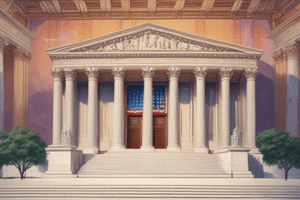Podcast
Questions and Answers
Who was the first person to bring a case to the Supreme Court?
Who was the first person to bring a case to the Supreme Court?
John Marshall
What power did Congress have as agreed by the Supreme Court in McCulloch v. Maryland?
What power did Congress have as agreed by the Supreme Court in McCulloch v. Maryland?
The power to create a federal bank
What is an implied power?
What is an implied power?
A power that is suggested by the Constitution
What does the excerpt from Article 1, Section 8 of the Constitution reinforce?
What does the excerpt from Article 1, Section 8 of the Constitution reinforce?
What was the purpose of the Judiciary Act of 1789?
What was the purpose of the Judiciary Act of 1789?
How might the decision in McCulloch v. Maryland complicate future Supreme Court decisions?
How might the decision in McCulloch v. Maryland complicate future Supreme Court decisions?
How did Gibbons v. Ogden expand the idea of federal supremacy?
How did Gibbons v. Ogden expand the idea of federal supremacy?
Why did William Marbury most likely support the Judiciary Act of 1789?
Why did William Marbury most likely support the Judiciary Act of 1789?
Why was James Madison sued, resulting in Marbury v. Madison?
Why was James Madison sued, resulting in Marbury v. Madison?
Study Notes
John Marshall and the Supreme Court
- John Marshall was the first Chief Justice of the United States and pivotal in establishing the role of the Supreme Court.
- He brought landmark cases to the Supreme Court, shaping the judicial system.
McCulloch v. Maryland
- In the case of McCulloch v. Maryland, the Supreme Court ruled in favor of James McCulloch, affirming Congress's authority to establish a federal bank.
- This case exemplified the use of implied powers, which are powers not explicitly stated in the Constitution but are necessary to implement its provisions.
Constitutional Powers and Federal Supremacy
- Article 1, Section 8 of the U.S. Constitution empowers Congress to regulate commerce, reinforcing the principle of federal supremacy over state laws and powers.
- The judiciary act of 1789 was established to create a federal court system, laying the foundation for federal judiciary operations.
Implications of McCulloch v. Maryland
- The ruling in McCulloch v. Maryland reinforced federal supremacy, suggesting future cases may favor federal powers over states' rights, complicating state-federal relations in judicial decisions.
Gibbons v. Ogden
- Gibbons v. Ogden expanded federal supremacy by affirming Congress's authority to regulate interstate trade, further establishing the federal government's power over the states.
Marbury v. Madison
- William Marbury supported the Judiciary Act of 1789, which allowed him to bring his case before the Supreme Court.
- James Madison was sued in Marbury v. Madison for not honoring an appointment made by the previous administration, highlighting conflicts in presidential transitions and judicial appointments.
Studying That Suits You
Use AI to generate personalized quizzes and flashcards to suit your learning preferences.
Description
Explore key concepts about the Supreme Court and its impact on governmental structure through this detailed flashcard set. Learn about significant cases, such as McCulloch v. Maryland, and the importance of implied powers within the Constitution. Perfect for students studying government and constitutional law.




